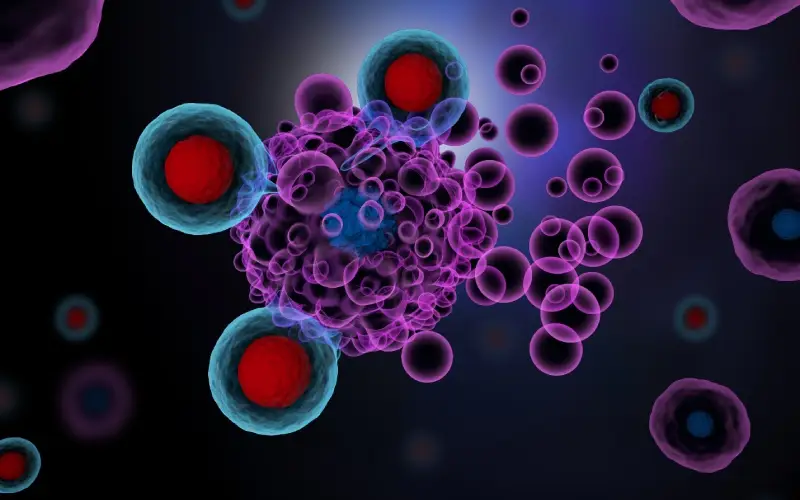In recent years, cellular immunotherapy has emerged as a promising treatment for patients with hematologic cancers. Single-nucleotide variants in key T cell genes can drive clinical pathologies and could be repurposed to improve cellular cancer immunotherapies. Benjamin Izar, MD, PhD, a medical oncologist and member of the Tumor Biology and Microenvironment Program at the Herbert Irving Comprehensive Cancer Center at NewYork-Presbyterian and Columbia, is leading pivotal research using single cell techniques, genome editing, and systems biology to explore some of the cancer field’s most pressing problems. Below, Dr. Izar and Zachary Walsh, an MD/PhD graduate student in Dr. Izar’s laboratory, discuss their recent proof-of-concept study which leverages CRISPR-dependent base-editing to enhance cellular immunotherapies.
This approach could be used with existing cell therapies, where we modify those products to make them more active and less likely to fail in patients, or we could build entirely new products using these variant proteins as a foundation.
— Dr. Benjamin Izar
The Research Challenge
While some patients have durable responses following cellular therapies and existing cancer immunotherapies, most do not. For their research, Dr. Izar and Mr. Walsh wanted to test the introduction of small changes to the genome using a new technique called base-editing and see if it would be sufficient to improve the function of T cells. “This approach could be used with existing cell therapies, where we modify those products to make them more active and less likely to fail in patients, or we could build entirely new products using these variant proteins as a foundation,” explains Dr. Izar.

The researchers have identified a panel of mutations which enhanced T cell activity in several cellular immunotherapy models.
A Novel Hypothesis
An innovative take on CRISPR emerged from a theory developed by Mr. Walsh who used his knowledge of cell physiology and clinical pathologies to devise a strategy to improve cellular therapies. “We were interested in trying to figure out ways to supercharge the T cell immunotherapy to enhance anti-tumor activity,” says Mr. Walsh, the first author on the study paper published in Nature Biotechnology. “In patients, you will see many different single-base germline mutations in DNA in different T cell genes leading to profound immunopathologies that range from immunodeficiencies to autoimmunity. This led us to a hypothesis that some of these mutations, when precisely engineered in T cells would ramp up their activity.”
The Experimental Design
“Our hypothesis was not easily testable until CRISPR base-editing, which enabled us to make very precise, single-base changes at specific genetic loci,” explained Mr. Walsh.
The researchers developed a base-editing screen approach to test tens of thousands of mutations in over 100 different genes in primary human T cells to determine which mutations would enhance the activity of these cells. After mapping the impact of these variants on T cell function, they selected only those that improved the hallmarks of T cell activities known to be critical in eliminating cancer.
From this, the research team identified a panel of mutations which enhanced T cell activity in several clinically relevant cellular immunotherapy models, including CAR-T therapy for leukemia and T cell receptor (TCR)-T therapy for melanoma. They also identified a series of mutations that cluster together in regions of the same gene. “A key innovation in our study resulted from the knowledge we acquired from patients,” says Dr. Izar. “Certain mutations in the germline lead to immunodeficiency or autoimmunity syndromes that are frequently determined and driven by single-point mutation, not by loss or amplification of a gene.”
The technical innovation is that it is possible to introduce specific mutations in human T cells efficiently, without the need to delete the gene, which may have unintended and frequently unknown consequences.
— Dr. Benjamin Izar
Based on this information, the researchers concluded that these “experiments of nature” in which people are born with specific mutations and have clinical autoimmunity syndromes can be leveraged to engineer human T cells to improve cellular cancer immunotherapies. “The technical innovation is that it is possible to introduce very specific mutations in human T cells efficiently, without the need to delete the gene, which may have unintended and frequently unknown consequences.” adds Dr. Izar.
Impact of Findings
Their proof-of-concept study demonstrated that experiments of nature can potentially inform the next generation of immunotherapies to improve patient response. According to the researchers, this scalable approach can be performed rapidly and efficiently. “It is evident that our ability to tease out the effects of these engineered T cells through a combination of experimental innovations, computational biology and artificial intelligence, will accelerate the identification of genes and the resulting protein structures that are most promising,” says Dr. Izar.
Working with experts in structural modeling, the researchers subsequently sought to understand how these mutations in the protein affect cell function and how they might be repurposed for a therapeutic intent. “By generating a three-dimensional model of the proteins to infer the functional consequences of these mutations, we found that they were likely taking the brakes off of the protein function and increasing the level of T cell activity,” says Mr. Walsh. “This helped to validate the mechanism behind their effects. It also provided us with an additional level of confidence when determining regions of the protein that might be engineered or targeted in the future.”
“Our research, which was fully supported by the Human Tissue Immunology and Immunotherapy Initiative of the Herbert Irving Comprehensive Cancer Center at NewYork-Presbyterian and Columbia, is a significant foray into this field,” adds Dr. Izar. “Exploring the use of these methods to understand normal immunology and tumor immunity, as well as leveraging them for therapeutic purposes, is now a major pillar in our lab.”



